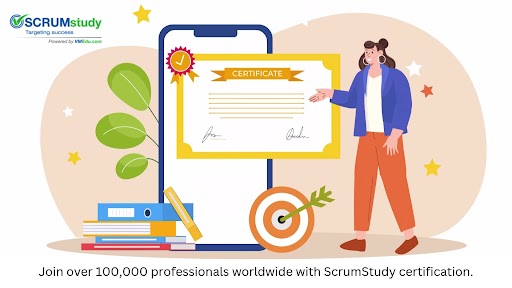
Introduction to Scrum Certification
In today’s dynamic business environment, the demand for Agile methodologies is surging, making Scrum Certification a pivotal qualification for professionals aiming to enhance their project management skills. Our comprehensive guide delves into the essentials of Scrum master Certification, revealing how it can propel your career and transform organizational efficiency. This article aims to provide an in-depth exploration of Scrum certification, emphasizing its benefits, structure, and the strategic advantages it offers to both individuals and organizations.
Understanding Scrum Certification
What is Scrum Certification?
Scrum Certification is a formal recognition of an individual’s proficiency in the Scrum framework, an Agile methodology designed to improve project delivery through iterative development and collaborative teamwork. The certification process involves a thorough understanding of Scrum principles, roles, events, and artifacts, providing professionals with the tools needed to implement Scrum effectively.
The Importance of Scrum Certification
Obtaining Scrum Certification is more than just a credential; it is a testament to one’s commitment to mastering Agile practices. It enhances career prospects, boosts marketability, and equips professionals with the skills necessary to lead high-performing Scrum teams. For organizations, having Scrum-certified professionals on board is crucial for fostering a culture of continuous improvement, innovation, and agile transformation.
Key Benefits of Scrum Certification
Enhanced Knowledge and Skills
Scrum Certification provides a deep dive into the core aspects of Scrum, including:
- Scrum Roles: Understanding the responsibilities of the Product Owner, Scrum Master, and Development Team.
- Scrum Events: Mastering the mechanics of Sprint Planning, Daily Scrum, Sprint Review, and Sprint Retrospective.
- Scrum Artifacts: Gaining insights into Product Backlog, Sprint Backlog, and Increment.
This thorough understanding enhances your ability to manage projects efficiently, ensuring that you can facilitate Scrum ceremonies effectively and drive project success.
Increased Career Opportunities
Scrum Certification is a valuable asset in the job market. It differentiates you from other candidates by showcasing your expertise in Agile methodologies. Certified Scrum professionals are in high demand, with many organizations prioritizing Scrum experience for project management roles. This certification not only boosts your resume but also opens doors to advanced career opportunities, such as Scrum Master, Product Owner, or Agile Coach positions.
Improved Team Dynamics and Collaboration
One of the standout advantages of Scrum Certification is its focus on team dynamics and collaboration. Certified Scrum professionals are trained to foster a collaborative environment, encouraging open communication, trust, and mutual respect among team members. This leads to:
- Higher Team Morale: Promoting a positive and supportive team culture.
- Enhanced Productivity: Streamlining workflows and minimizing bottlenecks.
- Better Project Outcomes: Delivering high-quality products on time and within budget.
How to Obtain Scrum Certification
Choosing the Right Certification Path
There are several Scrum certifications available, each catering to different roles and experience levels. The most recognized certifications include:
- Certified ScrumMaster (CSM): Ideal for those new to Scrum, focusing on the role of the Scrum Master.
- Certified Scrum Product Owner (CSPO): Designed for professionals who want to specialize in product ownership.
- Professional Scrum Master (PSM): A more advanced certification for experienced Scrum Masters.
- Scrum Product Owner Certified (SPOC): Targets those looking to deepen their expertise in product ownership.
Training and Examination Process
The path to Scrum Certification typically involves:
- Selecting a Training Program: Choose from accredited training providers that offer comprehensive courses covering all aspects of Scrum.
- Participating in the Course: Engage in interactive sessions, practical exercises, and case studies to solidify your understanding of Scrum practices.
- Passing the Exam: After completing the training, you must pass a certification exam to validate your knowledge. The exam usually consists of multiple-choice questions that test your understanding of Scrum principles and practices.
Maintaining Your Certification
While Scrum certifications are generally valid for two years, it is essential to engage in continuous learning to stay updated with the latest Agile trends and practices. Many certification bodies offer renewal options through:
- Continuing Education: Attending workshops, webinars, and conferences.
- Professional Development Units (PDUs): Earning PDUs through relevant activities and contributions to the Agile community.
Practical Applications of Scrum Certification
Implementing Scrum in Your Organization
Certified Scrum professionals are equipped to lead Scrum implementations, driving Agile transformations within their organizations. Key steps include:
- Assessing Organizational Readiness: Evaluating the current state of processes, culture, and team dynamics.
- Creating a Scrum Adoption Plan: Developing a tailored strategy to introduce Scrum practices, including training, coaching, and mentorship.
- Facilitating Scrum Events: Leading Scrum ceremonies with best practices to ensure smooth execution and continuous improvement.
Driving Continuous Improvement
Scrum Certification instills a mindset of continuous improvement. Certified professionals are adept at:
- Facilitating Retrospectives: Conducting retrospectives to identify areas for improvement and implement actionable changes.
- Encouraging Innovation: Fostering a culture of innovation and experimentation within teams.
- Monitoring Progress: Using metrics and feedback loops to track performance and drive enhancements.
Success Stories and Testimonials
Many professionals and organizations have realized significant benefits from Scrum Certification. Here are a few success stories:
- John Doe, Scrum Master: “The CSM course transformed my approach to project management. It enhanced my ability to lead teams effectively, resulting in a 30% increase in project delivery speed.”
- TechCorp: “Implementing Scrum with the help of certified Scrum professionals led to a 40% improvement in product quality and a 50% reduction in time-to-market.”
These testimonials highlight the tangible impact of Scrum Certification on individual careers and organizational success.
Conclusion
Embarking on the journey to Scrum Certification is a strategic move for anyone looking to excel in Agile project management. It equips you with the skills, knowledge, and confidence to drive successful Scrum implementations, enhance team collaboration, and achieve remarkable project outcomes. Whether you are a novice or an experienced professional, Scrum Certification is a valuable investment in your career and your organization’s future.
